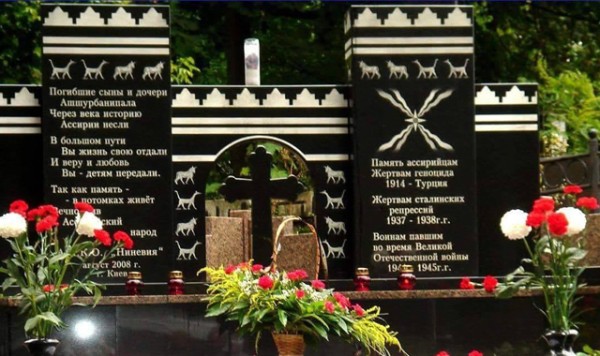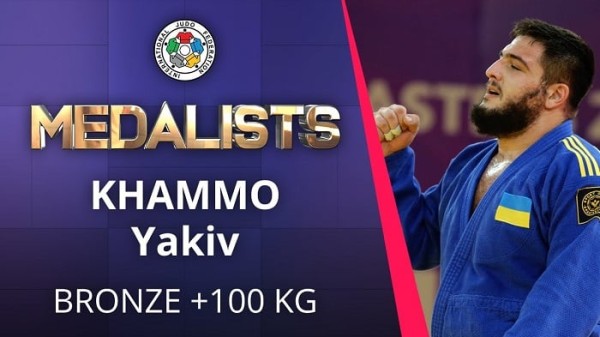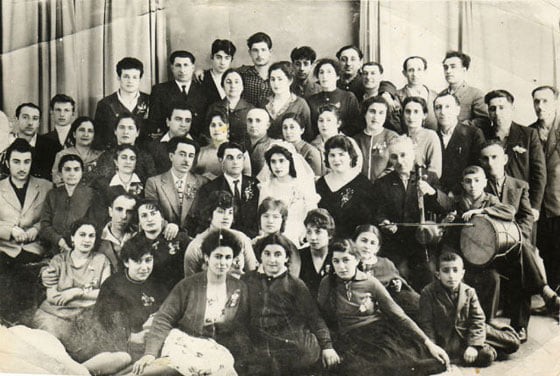
Assyrian monument for the fallen from 1914-1945, at Baikove Cemetery in Kiev, erected on 5 September 2008.
Ishtartv.com - greekcitytimes.com
With the recent emergence of Ukraine in the news, it would surprise some
to discover that there are also Assyrians who live there.
The Assyrian diaspora communities in the Ukraine were founded in the
late 19th century by Assyrians from Urmia in Iran, who used to go to cities
such as Kiev or Mariupol to practice skills such as carpentry or as builders.
Often they would return home to their villages with the money they had
earned, but some did stay.
These were joined by refugees fleeing the Ottoman Empire and Iran during
and after the First World War. In the last three decades though, many Assyrians
have immigrated to the Ukraine especially from Armenia.
Among the well-known Assyrians born in the Ukraine is the late musical
virtuoso Rabi Alexander “Shoora” Michailian (1930-2022), who was born in
Kharkiv and recently passed away in Sydney, Australia.
Others may have heard of are Zaya Avdysh (Kiev 1945 – Zhitomir 2015),
who was a Soviet football player, Ukrainian football coach, manager and
president of FC Polissya Zhitomir, as well as his younger brother Valeriy (born
1950), also a Soviet football player, Ukrainian football referee and linesman.
Another Soviet Assyrian footballer and Ukrainian fooball coach was
Anatoliy Zayaev (Simferopol 1931 – Melitopol 2012).
Then there is the bronze medalist judoka Yakiv Khammo (born Donetsk 1994),
who competed at the 2016 and 2020 Olympic Games.
Less known, but no less important was Prof. Promarz Tamrazov
(1933-2012), an internationally acclaimed Ukrainian mathematician of Assyrian
descent, doctor of physical and mathematical sciences and corresponding member
of the National Academy of Sciences of Ukraine.
The Ukrainian capital Kiev is also the home of Victor Avidshev (born
Khanlar, Azerbaijan 1956), a world champion Greco-Roman wrestler of the late
1970s and one of the country’s most famous wrestling and weightlifting coaches,
having trained the national team in the late 1990s.
At that time (c. 2015), there were about 7,500 Assyrians in the Ukraine.
There were about 1,600 Assyrians in the Donbass region, or the Donets
River basin:
– Of these, 800 were in areas of
Donetsk Oblast still under Ukrainian government control, at Mariupol,
Konstantinovka, Pokrovsk, Kramatorsk and Slovyansk (with roots in Urmia, Upper
Barwar, Albaq, Diz, Tal, Lewin and Khananis).
– Another 550 were in cities
controlled by Donetsk People’s Republic including Donetsk, Makiivka, Horlivka
and Debal’tseve (with roots in Gawar, Mar-Bishu, Nochiya, Tergawar and Tal).
– Finally, about 250 Assyrians lived
in cities controlled by the Luhansk People’s Republic, including Lugansk,
Sverdlovsk and Khrustalny (mostly with roots from Tal).
In the rest of the Ukraine, there were about 5,800 Assyrians, scattered
in 17 of the country’s provinces – with the largest communities in Nova
Kakhovka (300-400 households), Kiev (c. 1,000 people) and Nizhyn (c. 400
people).
Other Assyrian communities and families could be found in the cities and
towns of Vinnytsia, Mykolaiv, Zolotonosha, Odessa, Zaporizhia, Zhitomir,
Kharkiv, Dnipro, Kryvyi Rih, Lviv, Kamianske, Melitopol, Berdyansk, Sumy,
Poltava, Berdychiv, Kherson, Slavuta, Pryluky, Ivano-Frankivsk and Kirovograd.
The Assyrians in these parts of the Ukraine trace their ancestry to
districts in the homeland such as Jilu, Gawar, Diz, Albaq, Nochiya, Tergawar,
Mar-Bishu, Urmia and Tal.
Another 110 Assyrians lived in the Crimean cities of Simferopol and
Kerch (some of them with roots in Albaq) – but this former Ukrainian territory
had already been incorporated into the Russian Federation by March 2014.
War and violence is never the answer, and everyone engaging in it and
affected by it loses. We hope our small
Assyrian community in the Ukraine will be OK!

The bronze medalist judoka Yakiv Khammo

Assyrian wedding in Zolotonosha in the 1950s.
|